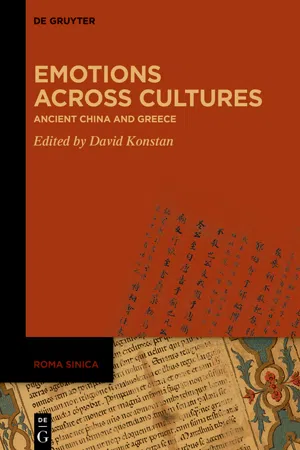
Emotions across Cultures
Ancient China and Greece
David Konstan, David Konstan
- 342 pages
- English
- ePUB (adapté aux mobiles)
- Disponible sur iOS et Android
Emotions across Cultures
Ancient China and Greece
David Konstan, David Konstan
À propos de ce livre
It is now recognized that emotions have a history. In this book, eleven scholars examine a variety of emotions in ancient China and classical Greece, in their historical and social context. A general introduction presents the major issues in the analysis of emotions across cultures and over time in a given tradition. Subsequent chapters consider how specific emotions evolve and change. For example, whereas for early Chinese thinkers, worry was a moral defect, it was later celebrated as a sign that one took responsibility for things. In ancient Greece, hope did not always focus on a positive outcome, and in this respect differed from what we call "hope." Daring not to do, or "undaring, " was itself an emotional value in early China. While Aristotle regarded the inability to feel anger as servile, the Roman Stoic Seneca rejected anger entirely. Hatred and revenge were encouraged at one moment in China and repressed at another. Ancient Greek responses to tragedy do not map directly onto modern emotional registers, and yet are similar to classical Chinese and Indian descriptions. There are differences in the very way emotions are conceived. This book will speak to anyone interested in the many ways that human beings feel.
Foire aux questions
Informations
A Brief History of Daring
The person who speaks with understanding (xun noōi) must insist upon what is shared (xunōi) by all, as a city insists upon its laws and customs. – Heraclitus fr. 114 Diels-KranzThe institutions and policies of the former kings are the tools the ruler uses to share with (gong 共) the crowd. His orders are the tools he, a single person (du 獨), uses to rule others. 先王之政所以與眾共也, 己之命所以獨制人也. – Wang Fu, Qianfu lun(“Shuai zhi” 衰制 chap.).
Table des matières
- Title Page
- Copyright
- Contents
- Introduction Comparing Emotions Historically
- You are What Eats at You: Anxiety in Medieval Chinese Divinatory and Medical Manuals
- Can We Find Hope in Ancient Greek Philosophy? Elpis in Plato and Aristotle
- A Brief History of Daring
- Anger as an Ethnographic Trope: Changing Views from Aristotle to Seneca
- Hatred and Revenge in Ancient China During the Qin and Han (221 B.C.-220 A.D.): The Expression of Emotions and the Conflict between Ritual and Law
- Tragic Emotions – Then and Now
- Analyzing the Emotions across Three Ancient Cultures: Greece, India, China
- Gender, Social Hierarchies, and Negative Emotions in Liu Xiang’s Biographies of Women
- Emotions, Measurement and the Technê of Practical Wisdom in Xúnzǐ’s Ethical Theory
- Index